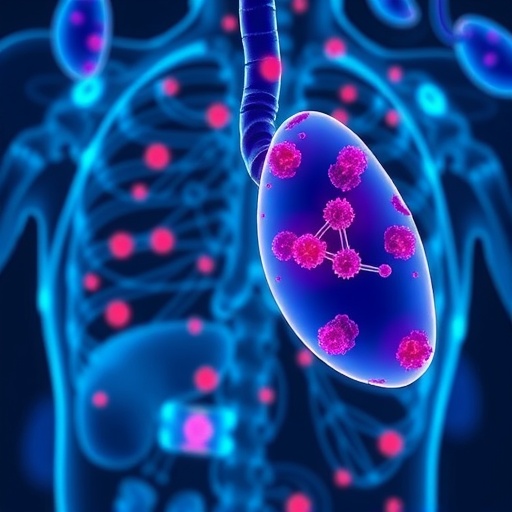Remifentanil, an opioid analgesic frequently used in clinical anesthesia, has recently emerged in scientific studies, revealing potential benefits beyond its pain-relieving capabilities. Recent research published by Ozmen et al. sheds light on the effects of remifentanil in a specific context: its role in mitigating lipopolysaccharide (LPS)-induced genital tract injuries in a rat model of sepsis. This groundbreaking research opens new avenues for understanding how analgesics can influence inflammatory and oxidative stress responses in complex biological systems.
The study’s focus on LPS is particularly significant. LPS is known to trigger a robust immune response, leading to systemic inflammation that can culminate in sepsis. In the context of reproductive health, such inflammation can lead to detrimental effects on the genital tract, potentially impairing fertility and overall reproductive function. By examining how remifentanil interacts with these pathways, the researchers aim to identify new therapeutic strategies for preventing or ameliorating sepsis-related injuries in vulnerable populations.
In their methodology, the researchers employed a rigorously designed experimental setup using rat models that were induced with sepsis via LPS administration. This approach is crucial for accurately replicating the pathophysiology of human septic conditions. The response of the genital tract to such inflammatory insults posits significant implications, especially considering the commonality of sepsis in critical care settings.
During the study, several critical biomarkers were assessed to elucidate the underlying mechanisms by which remifentanil exerts its protective effects. Inflammatory mediators such as cytokines and adhesion molecules were measured, providing invaluable insights into the degree of inflammation present in the genital tract tissues of the experimental subjects. The examination of oxidative stress markers further delineated the balance between pro-oxidative and antioxidative states, key components that dictate tissue health and response to injury.
A fascinating aspect of the research involves investigating mitochondrial function in the context of sepsis. Mitochondria are not only the energy powerhouses of the cell but also play a pivotal role in cell survival during stress. The study revealed that remifentanil may enhance mitochondrial gene expression, shifting the balance toward a protective mitochondrial phenotype. This finding suggests that the analgesic could help maintain mitochondrial integrity during inflammatory attacks, supporting cell survival and function.
The results of this research offer promising implications for clinical practices. If remifentanil can effectively reduce inflammation and oxidative stress in the genital tract during sepsis, it could become a valuable adjunct therapy in managing sepsis-related reproductive complications. The translational potential of these findings could resonate deeply within the realms of obstetrics and gynecology, especially regarding how we approach the treatment of pregnant patients or those with underlying reproductive issues who develop sepsis.
Moreover, these findings highlight an exciting interdisciplinary intersection between anesthesiology, reproductive medicine, and critical care. As more studies emerge investigating the role of anesthetics beyond their traditional uses, it paves the way for a re-evaluation of how we administer these drugs, particularly in acute clinical situations where the stakes are high.
Importantly, the research by Ozmen et al. emphasizes the need for continued exploration of pharmacological interventions that target specific pathways in disease processes. By understanding the nuanced mechanisms by which remifentanil functions, researchers can better characterize the drug’s pharmacodynamic properties and possibly lead to the development of new protective strategies against sepsis-induced complications.
The implications of this study reach not only the therapeutic landscape of sepsis management but also the broader realms of pain management in critical care settings. With the ongoing opioid crisis, understanding alternative therapeutic options remains integral to comprehensive patient care. The delicate balance between pain management and potential drug dependency necessitates a reevaluation of the benefits and risks associated with opioid use in vulnerable patient populations.
As this research continues to make waves, it poses compelling questions about the future of opioid use in non-pain contexts and their potential roles as multi-faceted therapeutic agents. The hope is that further investigations will build on these foundational findings, elucidating how adjustments in existing treatment protocols could lead to enhanced patient outcomes, particularly in the face of sepsis.
This novel exploration of remifentanil serves as a reminder that our understanding of pharmaceuticals and their impacts can evolve significantly in response to rigorous scientific inquiry. Moreover, it underscores how traditional views on drug efficacy can shift when placed under the lens of innovative research approaches. The continual push for new clinical insights will remain vital as we strive to optimize care for critically ill patients and understand the complex dynamics of their illnesses.
In summary, the work of Ozmen et al. exemplifies how scientific investigation can lead to groundbreaking revelations that pave the way for improved patient outcomes. As they expand on this foundational research, it is likely that the medical community will glean even more insights into how we can harmonize analgesic drugs with their evolving roles in managing complex conditions such as sepsis.
The promise embodied in the research serves as a clarion call for interdisciplinary dialogue, pushing boundaries towards a future where drug interactions and their multifaceted effects can redefine therapeutic strategies in treating critically ill patients.
Subject of Research: Remifentanil’s effect on LPS-induced genital tract injury in a rat sepsis model.
Article Title: Remifentanil Attenuates LPS-Induced Genital Tract Injury by Modulating Inflammation, Oxidative Stress, and Mitochondrial Gene Expression in a Rat Sepsis Model.
Article References: Ozmen, O., Asci, H., Topsakal, S. et al. Remifentanil Attenuates LPS-Induced Genital Tract Injury by Modulating Inflammation, Oxidative Stress, and Mitochondrial Gene Expression in a Rat Sepsis Model.
Reprod. Sci. 32, 2583–2594 (2025). https://doi.org/10.1007/s43032-025-01930-7
Image Credits: AI Generated
DOI: https://doi.org/10.1007/s43032-025-01930-7
Keywords: Remifentanil, LPS, sepsis, inflammation, oxidative stress, mitochondrial gene expression, reproductive health, rat model, analgesics, pharmacology, critical care.




